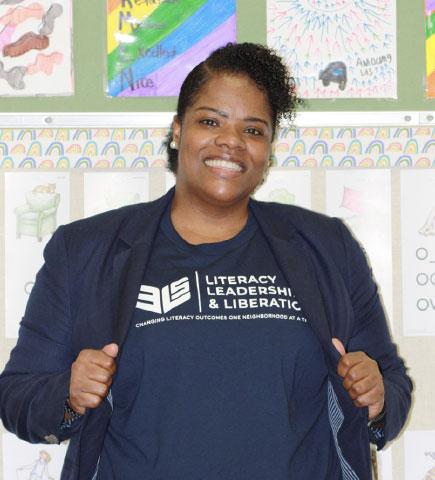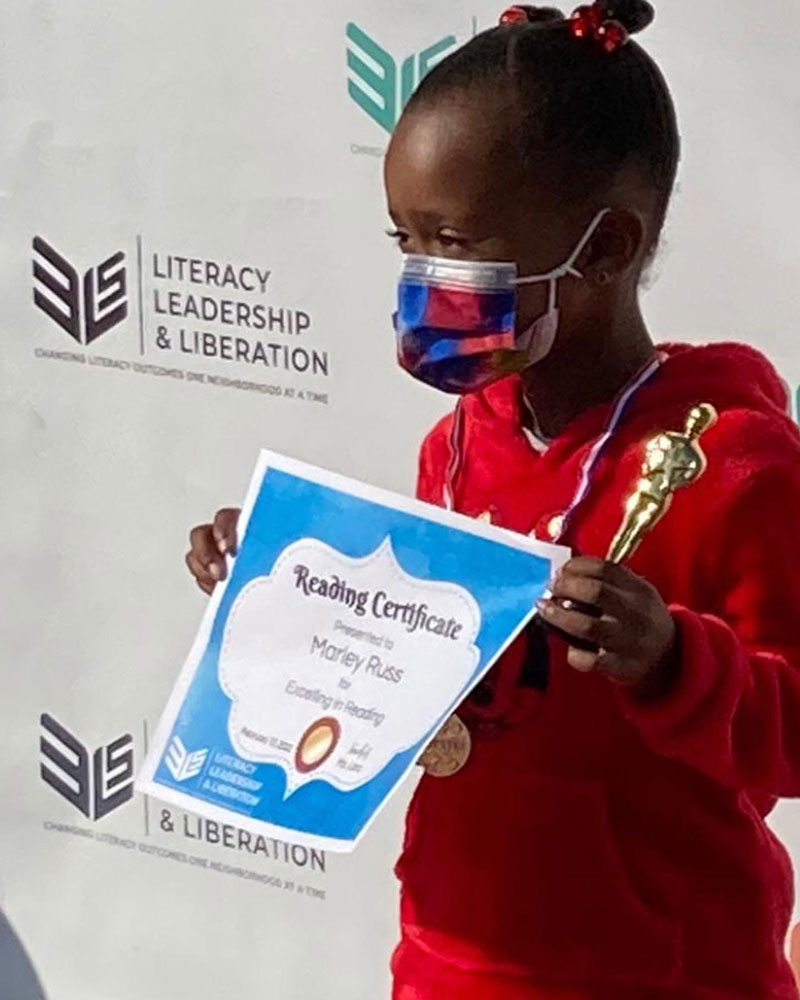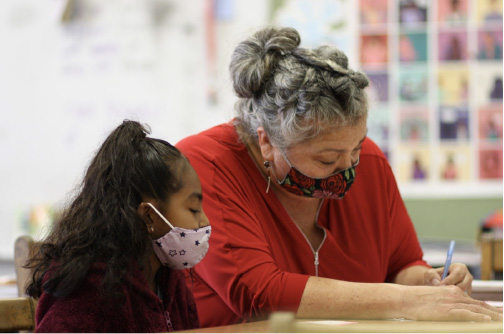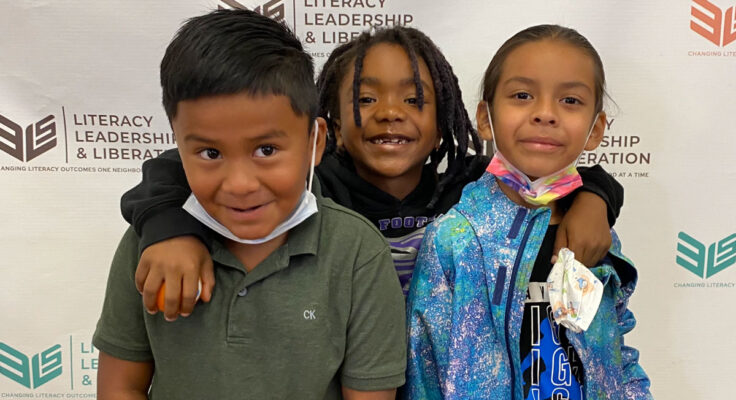Before Dr. Sabrina Moore was reading words on paper, she was reading the world. Dr. Moore—affectionately known in the community as Dr. Bri—is an Oakland native and the founder and executive director of Literacy, Leadership & Liberation (3Ls). Through her work, Dr. Bri is increasing literacy for Black and Brown people in Oakland. One neighborhood at a time, she’s moving toward 3Ls’ vision of Black and Brown children flourishing, free from the interrelated trappings of systemic illiteracy and poverty.
“The act of reading cannot happen independently of the world in which the reader exists.”
Dr. Paulo Freire
3Ls focuses on the four schools in Sobrante Park located in Oakland. They engage over 2,000 students and more than 6,000 residents through their five “Lit Lab Academy” programs: TK-3 Literacy Hub, Lit Lab Commons, Family Reading Club, Teacher Tune-Up Tuesdays and Leadership Coaching. 3Ls programming, centered in the science of reading and effective reading instruction, takes place inside and outside of school buildings, providing for students, families, teachers and members of surrounding communities. Dr. Bri and her team understand that literacy is holistic and that teaching and learning can and should expand beyond the pages of a book. “Literacy is life for us,” she says. “It’s bigger than words. It’s about how we see each other.” For Dr. Bri, it’s also very personal.
Informed By A Personal Literacy Journey

Perhaps ironically to some, Dr. Bri graduated high school unable to read. “My whole life,” she shares, “I had to navigate without text.” What she lacked in this form of literacy, though, she made up for in her ability to read her surroundings; understand the biases and racism embedded in the education system; and grasp the vital importance of literacy in the pursuit to survive and thrive, particularly for Black and Brown communities. The deep and ugly history of racist rule outlawing literacy among Black people is barely in our past. And current literacy rates for Black students would suggest literacy is outlawed in practice. This truth is at the heart of the organization’s whole-child approach and their anti-racist practices and trainings.
Dr. Bri’s ties to Oakland (including her 100 first cousins navigating the city’s systems) and personal literacy journey, combined with her experience as a teacher and principal in Oakland Unified School District, motivate and position her to be a deeply committed, insightful and impactful leader.
“3Ls provides educators with a framework of sustainable resources, systems and structures that empowers them in their literacy instruction. This framework encourages schools to open literacy learning for everyone in the community.”
Dr. Bri Moore, Founder and Executive Director, 3Ls
How It Started…
Dr. Bri first started this work as a classroom teacher, with one small-but-mighty “Homework Club” in a Sobrante Park house that a church lent her. Teachers showed up after school to support students across all grade levels. The team quickly began to recognize the need for a focus on literacy, for students and their families. Dr. Bri cites a 7th Grade Symposium in 2016 as a catalyst that made the team more intentional about engaging families and raised Dr. Bri’s question: “We talk about engagement, but what about inclusion?” And one part of that inclusive approach is reminding parents that they have a powerful place at the table. “Don’t let some book knowledge make you think you ain’t got the power to do what’s right by our kids, by our community, by our neighborhoods.”
“3Ls envisions its model as a three-year literacy transformation in which the neighborhood comes to conceive of itself as a team creating anti-racist learning cultures as the way to improve student outcomes.”
Dr. Bri Moore, Founder and Executive Director, 3Ls
Trusting Parents

Leveraging the power of parents and neighbors is key to 3Ls’ ability to progress toward their vision of a fully literate community. Dr. Bri shares, “We embrace and understand that our neighbors hold power that we need to leverage for our kids.”
Dr. Bri is far more interested in ceding power to families than in empowering them. “We bring parents to the table,” she says. “I want to let go of all power that you think I have.” She looks to family input to direct 3Ls’ programmatic work and doesn’t stop at listening. “Listen and do,” Dr. Bri emphasizes. “The community shaped 3Ls this year,” she says, elevating the fact that, even within one neighborhood, the four school communities vary significantly. Work in Madison Park Academy Primary took shape around the needs and desires that the school community identified. To be successful in the Sobrante Park community—despite it being just a mile up the road—Dr. Bri and her team couldn’t simply repurpose the successful program design from Madison Park Academy for Lodestar. They had to listen to the particular insights and priorities of the Lodestar community—different schools, different needs, same neighborhood. Listening and doing is a transformative and underutilized alternative to the typical institutional behavior of inviting feedback and claiming to have listened deeply, without making any significant changes based on the input received.
Returning To Normal? Or Redefining It?
The COVID-19 pandemic presented an opportunity to listen and do. When it hit, 3Ls quickly went virtual, establishing the Lit Lab Hub, an online afterschool literacy meetup for students in transitional kindergarten through third grade. The power of this hub resounds in Dr. Bri’s reflections. “It’s what it’s supposed to be,” she shares emotionally, as she explains the dynamism and beauty of the space, which provided students an opportunity to continue identifying as learners through the sudden pivot to remote instruction. Dr. Bri goes on to describe multiple students’ transformation throughout their time participating in the Lit Lab Hub. From painfully shy and quiet to confident and talkative. From doubting themselves to proudly proclaiming, “I’m a reader!”
And among the anxious cries for a return to “normal” in a “post-”pandemic world, Dr. Bri continues to fight for a future far better than what has been historically “normal” for Black and Brown communities. “What we need is something different. The data says what schools are doing isn’t working for Black kids,” Dr. Bri points out, “but you keep wanting to do the same things. That’s racist.” Dr. Bri’s clarity of thinking here makes obvious this often ignored, but truly logical conclusion. And her solution is not to add more to or to compete with classroom instruction, but rather to be a supplement and support. “It’s a partnership,” she says. “3Ls supplements what kids get in the school day. The teacher may not have the skills or resources to do it, so we’ll get a dyslexia screening. We’ll have students and their families at our hub. We’ll do family workshops so that families realize their baby learns a little differently.”
“3Ls believes our integrated, whole-neighborhood approach to literacy will lead to community transformation and break intergenerational cycles of poverty.”
Dr. Bri Moore, Founder and Executive Director, 3Ls
Alternative Strategies Lead To Improved Outcomes

3Ls’ approach is offering alternative strategies and improved outcomes. In their April 2022 Gaining Ground report, GO Public Schools acknowledged that Madison Park Academy Primary—a Sobrante Park school with a first-year principal and the only school that took advantage of all five 3Ls programs—was the only Oakland Unified School District school to meet GO’s standards for high reading growth for Black and Latinx students and English language learners.
Dr. Bri accepts that 3Ls has something to do with this progress, but remains humble. “We just shifted the paradigm,” she says, hesitating to claim responsibility for the change and without acknowledging that as the school’s former principal she laid the foundation from which the staff and new principal could thrive. “It’s just a shift in how we look at it. It’s about letting our people know, ‘It’s on us. We can let it be done to us or we can do it with them. Or we could do it ourselves.’”
The Kenneth Rainin Foundation is inspired by Dr. Bri’s leadership and the promising results 3Ls has yielded. 3Ls’ community-driven strategies and anti-racist interventions are ensuring that Black and Latinx students receive the supports that the education system has historically failed to offer them, while also offering resources for adult learners, teachers and principals that translate into further benefit in classrooms. “We continue to learn from 3Ls’ ability to blend liberatory design, structured literacy, anti-racist and capacity-strengthening practices effectively, which were core elements surfacing from the Community Strategy Council’s work,” shares Dana Cilono, Rainin Foundation Education Program Officer.
“We continue to learn from 3Ls’ ability to blend liberatory design, structured literacy, anti-racist and capacity-strengthening practices effectively…”
Dana Cilono, Education Program Officer, Kenneth Rainin Foundation

